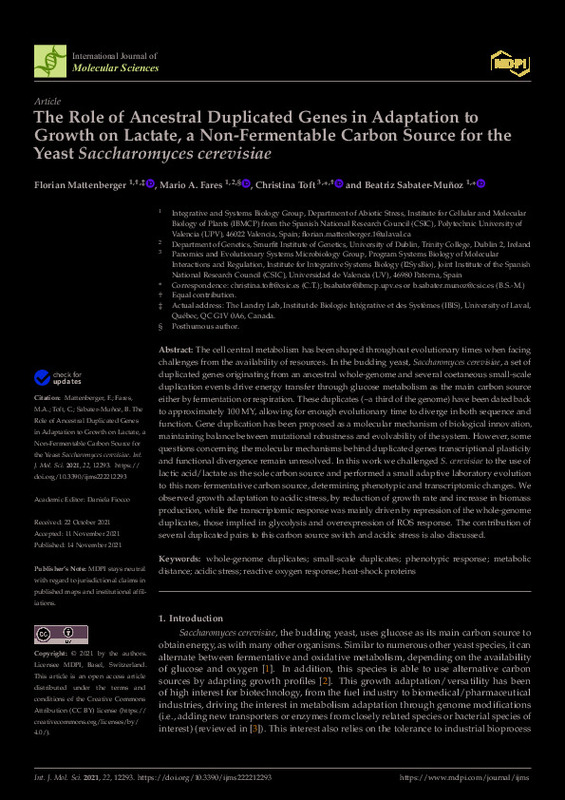JavaScript is disabled for your browser. Some features of this site may not work without it.
Buscar en RiuNet
Listar
Mi cuenta
Estadísticas
Ayuda RiuNet
Admin. UPV
The Role of Ancestral Duplicated Genes in Adaptation to Growth on Lactate, a Non-Fermentable Carbon Source for the Yeast Saccharomyces cerevisiae
Mostrar el registro sencillo del ítem
Ficheros en el ítem
| dc.contributor.author | Mattenberger, Florian
|
es_ES |
| dc.contributor.author | Fares Riaño, Mario Ali
|
es_ES |
| dc.contributor.author | Toft, Christina
|
es_ES |
| dc.contributor.author | Sabater-Muñoz, Beatriz
|
es_ES |
| dc.date.accessioned | 2022-09-16T18:04:07Z | |
| dc.date.available | 2022-09-16T18:04:07Z | |
| dc.date.issued | 2021-11 | es_ES |
| dc.identifier.uri | http://hdl.handle.net/10251/186213 | |
| dc.description.abstract | [EN] The cell central metabolism has been shaped throughout evolutionary times when facing challenges from the availability of resources. In the budding yeast, Saccharomyces cerevisiae, a set of duplicated genes originating from an ancestral whole-genome and several coetaneous small-scale duplication events drive energy transfer through glucose metabolism as the main carbon source either by fermentation or respiration. These duplicates (~a third of the genome) have been dated back to approximately 100 MY, allowing for enough evolutionary time to diverge in both sequence and function. Gene duplication has been proposed as a molecular mechanism of biological innovation, maintaining balance between mutational robustness and evolvability of the system. However, some questions concerning the molecular mechanisms behind duplicated genes transcriptional plasticity and functional divergence remain unresolved. In this work we challenged S. cerevisiae to the use of lactic acid/lactate as the sole carbon source and performed a small adaptive laboratory evolution to this non-fermentative carbon source, determining phenotypic and transcriptomic changes. We observed growth adaptation to acidic stress, by reduction of growth rate and increase in biomass production, while the transcriptomic response was mainly driven by repression of the whole-genome duplicates, those implied in glycolysis and overexpression of ROS response. The contribution of several duplicated pairs to this carbon source switch and acidic stress is also discussed. | es_ES |
| dc.description.sponsorship | This research was funded by Spanish National Plan for Scientific and Technical Research and Innovation from the Spanish Ministry of Economy and Competitiveness (MINECOFEDER), actually the Ministry of Science and Innovation (MCIN), Spanish Research Agency (AEI), MCIN/AEI/10.13039/501100011033 and ERDF A way of making Europe (FEDER "Una forma de hacer Europa") with grant number BFU2015-66073-P (to M.A.F.) and Generalitat Valenciana, Conselleria de Innovacion, Universidades y Sociedad Digital with grant number SEJI/2018/046 (to C.T.). F.M. was supported by a Spanish PhD Fellowship number FPI BES-2016-076677, from MCIN/AEI/10.13039/501100011033 and ESF "Investing in your future". | es_ES |
| dc.language | Inglés | es_ES |
| dc.publisher | MDPI AG | es_ES |
| dc.relation.ispartof | International Journal of Molecular Sciences | es_ES |
| dc.rights | Reconocimiento (by) | es_ES |
| dc.subject | Whole-genome duplicates | es_ES |
| dc.subject | Small-scale duplicates | es_ES |
| dc.subject | Phenotypic response | es_ES |
| dc.subject | Metabolic distance | es_ES |
| dc.subject | Acidic stress | es_ES |
| dc.subject | Reactive oxygen response | es_ES |
| dc.subject | Heat-shock proteins | es_ES |
| dc.title | The Role of Ancestral Duplicated Genes in Adaptation to Growth on Lactate, a Non-Fermentable Carbon Source for the Yeast Saccharomyces cerevisiae | es_ES |
| dc.type | Artículo | es_ES |
| dc.identifier.doi | 10.3390/ijms222212293 | es_ES |
| dc.relation.projectID | info:eu-repo/grantAgreement/MINECO//BFU2015-66073-P/ES/CARACTERIZANDO LOS MECANISMOS DE INNOVACION POR DUPLICACION GENICA/ | es_ES |
| dc.relation.projectID | info:eu-repo/grantAgreement/GVA//SEJI%2F2018%2F046/ | es_ES |
| dc.relation.projectID | info:eu-repo/grantAgreement/MINECO//BES-2016-076677/ | es_ES |
| dc.rights.accessRights | Abierto | es_ES |
| dc.contributor.affiliation | Universitat Politècnica de València. Instituto Universitario Mixto de Biología Molecular y Celular de Plantas - Institut Universitari Mixt de Biologia Molecular i Cel·lular de Plantes | es_ES |
| dc.description.bibliographicCitation | Mattenberger, F.; Fares Riaño, MA.; Toft, C.; Sabater-Muñoz, B. (2021). The Role of Ancestral Duplicated Genes in Adaptation to Growth on Lactate, a Non-Fermentable Carbon Source for the Yeast Saccharomyces cerevisiae. International Journal of Molecular Sciences. 22(22):1-17. https://doi.org/10.3390/ijms222212293 | es_ES |
| dc.description.accrualMethod | S | es_ES |
| dc.relation.publisherversion | https://doi.org/10.3390/ijms222212293 | es_ES |
| dc.description.upvformatpinicio | 1 | es_ES |
| dc.description.upvformatpfin | 17 | es_ES |
| dc.type.version | info:eu-repo/semantics/publishedVersion | es_ES |
| dc.description.volume | 22 | es_ES |
| dc.description.issue | 22 | es_ES |
| dc.identifier.eissn | 1422-0067 | es_ES |
| dc.identifier.pmid | 34830177 | es_ES |
| dc.identifier.pmcid | PMC8622941 | es_ES |
| dc.relation.pasarela | S\459940 | es_ES |
| dc.contributor.funder | Generalitat Valenciana | es_ES |
| dc.contributor.funder | European Regional Development Fund | es_ES |
| dc.contributor.funder | Ministerio de Economía y Competitividad | es_ES |








